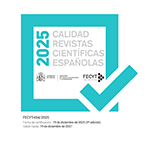The Right to the City, «chronicle of a death announced». Digitalization or crisis of the Urban
Abstract
In a world that is approaching 8 billion people, in which cities and with them the urban way of life have gone from being a hypothesis to a reality and where cities are constituting the spearhead of economic and social development world, paradoxically, cities are blurring, becoming large diffuse aggregates, most of them with serious management difficulties, whose reason for being and nature is lost, despite the continuous appeal by urban operators of the need to find appropriate forms of political management. All cities, but mainly large cities, constitute a Janus mirror; on the one hand, they are centers of innovation and wealth; On the other hand, they present increasingly pronounced levels of inequality.
From the 90s onwards, cities have varied their urban strategy. From the city of dominant production in the last century, exponent of a productive economy, we have moved to the city of consumption. The first was a source of wealth, it was concerned with the problem of the location of productive activities, the second is an object of value, faced with the threat of relocation that shakes most cities, it has thrown itself into the arms of the consumer society and has attempted to monetarily value all available resources: landscape, culture, leisure, sport..., all at the service of a public future that gives value to the goods appreciated by an economy linked to consumption benefiting from changes in mobility patterns.
The digital city represents the latest addition in this process of change. The smart city emerges as a paradigm to imitate that, taking advantage of the impact of new technologies linked to the digital world, is presented as a technotopia capable of solving the serious problems that current cities face. Technology as an objective expression of scientific reason will be able to shed light on today's serious challenges. You simply must let it act
Downloads
Article download
License
In order to support the global exchange of knowledge, the journal CIC. Cuadernos de Información y Comunicación is allowing unrestricted access to its content as from its publication in this electronic edition, and as such it is an open-access journal. The originals published in this journal are the property of the Complutense University of Madrid and any reproduction thereof in full or in part must cite the source. All content is distributed under a Creative Commons Attribution 4.0 use and distribution licence (CC BY 4.0). This circumstance must be expressly stated in these terms where necessary. You can view the summary and the complete legal text of the licence.










